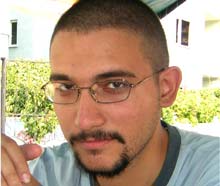 Take a careful look
at the passport-size photographs "corrected" by photographers using computer
programs. It's beyond doubt that there are good examples of them, but lots of these photos
don't look like the person they're supposed to. In fact, they look like androids rather
than humans. How can anyone accept his/her life as a whole as long as he/she hates the
marks that life has left on his/her face? Take a careful look
at the passport-size photographs "corrected" by photographers using computer
programs. It's beyond doubt that there are good examples of them, but lots of these photos
don't look like the person they're supposed to. In fact, they look like androids rather
than humans. How can anyone accept his/her life as a whole as long as he/she hates the
marks that life has left on his/her face?
Though I'm writing these sentences now, I must confess that it was great to get my first
corrected photograph. It was nice to get all marks on my face cleaned up. (It's funny that
I'm typing such a sentence because deleting them on the computer screen is not actually
cleaning them up. They've never disappeared in the real sense.) Though it was hard to be
sure that the kid in the photograph was me, I was very eager to equate myself with this
guy who had such a clear skin.
But it was impossible for me to accept the results when I saw a photograph of my
girlfriend last year. The photographer was so "benign" that anything other than
a pale skin color was deleted from her cheeks and nose. I couldn't keep myself from
imagining the photographer talking to his co-workers in his shop and erasing anything pink
from her cheeks, thinking that he was creating a brand-new rival to the Mona Lisa.
In the photograph, the face had no expression, no meaning. Nothing was alive, because
anything that could lead to a meaning was "corrected." Anything that reflected
the memories of that face was "corrected." This made me see what was missing
from my photograph as well. Any little mark that a person has collected over the course of
his/her lifetime is "corrected" by the photographer.
This idea of "correction" can only be that of someone who is ashamed of his/her
life. A person who thinks otherwise would be proud of showing off those marks at every
opportunity, like someone returning with scars from a battle. A face is the stage where a
person's character is viewed. Its lines are clues to past smiles and angers. Each and
every little mark is a shadow of an old memory. The colors on your face are the
reflections of your feelings: even though these feelings may be bad, theyre better than
feeling nothing. If you prefer a photograph without any of these, you're ashamed of being
yourself. Photoshop's techniques give us the opportunity to hide our past: the opportunity
to glorify our perfectly "modern" fish-memories and our addiction to denying our
true selves by creating a robotic face.
İsmail O. Postalcıoğlu (POLS/II)
orhan@ug.bcc.bilkent.edu.tr
 |







